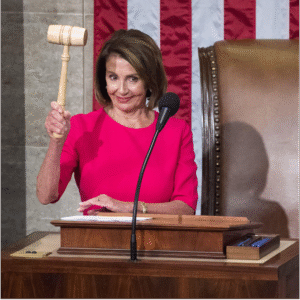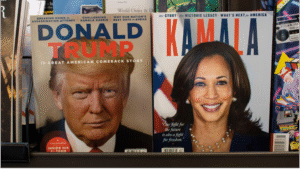17-year-old Reva Sobti is fed up with the games that women in politics are expected to play

Nancy Pelosi is elected Speaker of the House, 12 December 2019.
Picture by: Kevin Dietsch | UPI | Alamy
Article link copied.
June 13, 2025
Why are women politicians treated so differently from men?

In this episode of my Family Feud, the popular American game show, my family takes on the 2024 presidential election. Split into two teams, red and blue, we both competed to guess who America would choose. And well… we now know who won.
Last November, my family gathered to debrief the shocking results of the US election. Opinions were hurled across the dining tables, uncles and aunts competed to be heard over each other and, as the end of the night neared, the question of who was the better fit for the country – Trump or Kamala – still remained undecided.
Amid the personal reality show taking place around my dining table, another question arose in my mind. As the words “Kamala” and “Trump” were tossed around, something irked me. Why was it Kamala vs Trump to begin with?
Harbingers’ Weekly Brief
Why the first name?
Why is Kamala referred to by her first name instead of being given the same respect as Trump and referred to as Harris? I mean, just because my family is Indian does not mean we have that level of familiarity to be on a first-name basis with the former vice president.
In our society, important and historical figures are referred to by their last name out of respect. We say George Washington, not George, and the same goes for modern-day politicians. However, when it comes to female politicians, those rules often don’t apply. Whether it’s Kamala (not Harris) or Hillary (not Clinton), the same respect is not extended to these women in power.
And it goes beyond just their names when every aspect of their physical appearance from hair to clothes to questioning their capabilities, just because they are a female politician and not just a politician. The same traits that are rewarded in men are then looked down upon in women.
It is time we unpack this hypocrisy to understand what it takes to be a female politician in this world. In fact, this phenomenon applies beyond just female politicians, but to all working women.
A 2018 study on how gender affects how professionals are received, explored reasons for why women tend to be referred to by their first name. One is that women tend to change their surnames after marriage. Another is that ‘male’ is the assumed default when speaking about someone, so using the woman’s first name can help clarify their gender – for example, “Michelle” or “Michelle Obama” rather than simply “Obama”, which could be confused with her husband, Barack Obama.
Men dominate professional environments, so if Kamala Harris were to be referred to as “Harris” in conversation or even in a campaign, people would immediately assume that “Harris” is a man.
The default is always male, leaving spaces such as politics closed off for women.
Even the former vice president of the United States cannot escape the bias created simply by her being a woman.
‘Dress to impress’?
For most people, fashion is a form of expression. Whether they’re dressed in neon fluorescents or moody blacks, the way a person dresses is a window into who they are – to an extent. However, when fashion is turned against women and other minority communities, it becomes a weapon. This phenomenon is most evident in how female politicians are torn apart and discredited over their clothing.
Nancy Pelosi, former speaker of the House of Representatives and a Democrat from California, receives too much attention for her vibrant pink suits – but what she should be known for first is her role as a pioneer for women in politics.
She has led crucial legislation such as the Affordable Care Act and the American Rescue Plan. In 2024, she was even awarded the Presidential Medal of Honor, America’s highest civilian award, by former president Joe Biden.
In 2019, The New York Times publisheda controversial tweet the day Pelosi was elected to her second term as speaker of the House: “Nancy Pelosi, wearing a hot pink dress, ascended to the marble dais.” Instead of focusing on Pelosi’s monumental achievement, the first thing they found worth tweeting about was the hot pink dress she was wearing. (The NYT took down the tweet later the same day.)
While there is nothing inherently wrong about addressing fashion choices of female politicians (sometimes they represent covert rebellion), it becomes a problem when it is the first thing that is talked about.
Pelosi is purposeful in her clothing choices as they represent her pride in her womanhood in a field where feminine traits are looked down upon. However, her critics often point to her self-expression through clothing as a weakness or a reason to deem her incapable. Men, on the other hand, rarely undergo the same level of scrutiny for their clothing.
The fact that the NYT’s first response to Pelosi’s re-election was her clothes is proof that before her achievements and her worth, a woman will always be judged and valued by her appearance. If Steve Harvey, the long-time host of Family Feud, wore a dress, it wouldn’t take away from his ability to entertain, so why does the colour pink take away credibility from Pelosi?
Femininity is not a weakness and it is time we let that narrative go.
Too emotional to lead
I am not trying to say that the only reason Kamala Harris lost the presidential election is because she was a woman, but it is evident that simply being a woman is a huge roadblock to success.
Women in all professions are constantly labelled as “too emotional” or “too fragile”. The persistence of this narrative perpetuates the idea that there is something about men and masculine traits that make them more suited for careers, especially in politics.
A 2021 study into how traditional masculine standards disadvantage women in politics says: “To succeed as political leaders, women must balance performing a complex and contradictory set of desirable characteristics, presenting themselves as ‘up for the job’ in stereotypically masculine ways without appearing to challenge the female gender role.”
In simple terms, for a woman to succeed in politics she must behave like a man – as long as she doesn’t challenge the power of men and the systems they have established to box women in.

What happened to ‘Harris’? Magazine covers in an Oregon bookstore, September 2024.
Picture by: Ted Hsu | Alamy
Concluding the episode
While my Family Feud over politics is over – well, at least until the next Indian elections – the issue surrounding women in politics will not be done anytime soon. However, I call on the young women of the world and ask you to not lose hope. Women have been playing on an uneven playing field, merely playing to catch up to men, but, fear not, because we are getting there.
A Library of Congress report reveals that between 2004 and 2024 there has been an 11.4% increase in the number of legislative seats held by women around the world, from 15.6% to 27%. More women in positions of power means a more accurate representation of the diversity that is present.
In addition, in 2024 the Pew Research Center revealed that 47% of American women aged 25 to 34 have a degree, but only 37% of men. As women continue to become more educated, we will have more women stepping up into male-dominated fields such as STEM and politics. Once again, progress is slow, but headed in the right direction.
So I’d like to leave you with a quote by feminist social commentator Jane Caro: “We will only have true equality when there are as many mediocre women in positions of power as there are mediocre men.”
Written by:

The Harbinger Prize 2024 (Overall Winner)
Writer
United States
Reva Sobti was born in 2008 and currently studies in the United States. She plans to pursue a higher education at one of the T-25 universities to major in Sociology, Business, or Biology. Reva won the Harbinger Prize 2024 and plans to continue writing about social issues.
After successfully completing the Essential Journalism course, Reva became a writer for Harbingers’ Magazine starting in March 2025.
In her free time, she loves to read, watch movies, bake, play volleyball, and eat good food. A fan of travelling, Reva has so far visited 16 countries.
She speaks English, Hindi, Punjabi and Spanish.
Edited by:

🌍 Join the World's Youngest Newsroom—Create a Free Account
Sign up to save your favourite articles, get personalised recommendations, and stay informed about stories that Gen Z worldwide actually care about. Plus, subscribe to our newsletter for the latest stories delivered straight to your inbox. 📲
© 2025 The Oxford School for the Future of Journalism


